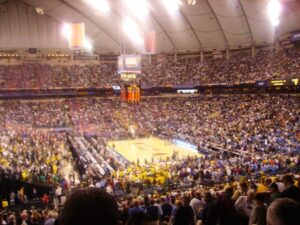By Brian Indre

With some surrounding jurisdictions ditching the one-size-fits-all mentality when it comes to recycling, the City of Falls Church is continuing to accept all kinds of items — including glass — at the curb while joining local governments in informing residents to remove other disposables from recycle bins altogether.
Items thrown into recycling bins are commodities, and those commodities’ worth go up and down depending on current markets. Each county has its own rebate and pricing structures according to its contracts with sorting and management facilities, which impacts communities differently. The proximity to particular facilities that have the technology to best manage the recycling plays a major role in where it goes and how much it costs to ship it to a facility.
The county specific bins that residents are provided are part of a single-stream system that is intended to make it easier on residents by not having to sort items; in turn making it more likely that recyclables make it into the bin and not the trash. Although, recent news reports claim that some of the items that we are putting into our bins are not being recycled at all, and even ending up in landfills.
Historically, the U.S. has exported its recycled waste to China, but because of new restrictions due to recycled waste being too contaminated, that is no longer an option. Now municipalities, and by extension its residents, are faced with new challenges on how to manage the mountains of recyclable waste that’s accumulated.
Republic Services has a bird’s eye view of the problem. The waste management company handles some of the recycling stream in Northern Virginia as well as throughout a majority of the country. Earlier this year the company conducted an online survey quiz (with over a thousand people) on what items are recyclable, and nearly half of the participants failed. 65 percent of participants thought plastic grocery bags could go in curbside bins. A slightly smaller percentage thought that clothing and aluminum foil was okay.
“The reason things are changing, and why we’re improving the inbound recyclable material, is so we can do a better job at recycling, as well as educating our residents,” says Will Mayhugh, maintenance manager at Republic Services, in Manassas. “The market value on recyclable material used to be quite high, and now it is no longer that way, due to the issue of shipping it to China.”
If residents do a better job of filling their bins with appropriate and clean recyclables, it will make for a much more efficient process at the facility end. As of right now, there is need for improvement, says Mayhugh. Twenty percent of Republic’s inbound volume, for example, is sent out as trash and should have never been here. In other words, all the wishful recycling done by residents at home just contaminates and causes more issues down the road.
The need for change is pressing, but as of now Falls Church has no plans on banning any items from the recycling stream, particularly glass. However, it would like residents to make sure that the appropriate items going in the bins are clean.
“Things that we see in the recycling stream that shouldn’t be there like, plastic bags, styrofoam, diapers, electronics, and a lot items that would have been recyclable if they had been cleaned properly,” said Lonnie Marquetti, the solid waste programs manager of Falls Church. “It’s very important to wash recyclables; contamination is extremely high, if you don’t clean out cans and jars, they are essentially trash.”
Educating the public on how to properly recycle is of utmost importance, and the City of Falls Church ranks high on the amount of refuse that is diverted from landfills. Marquetti mentions that the City’s waste diversion rate is historically at the top five in Virginia, and she commends conscious residents for that success.

Arlington County has been more proactive in revamping its recycling methods. It sent out notices to its residents saying that Aug. 1 would be the official day that it removes all glass items from its curbside bins. The reasoning is because glass is heavy and expensive to haul to recycling centers, and if it breaks it has to be hauled a second time to a landfill. A majority of glass breaks in the transport process from bin to truck, and truck to sorting facility. This broken glass is hard on the sorting machinery (it’s like pouring sand into the gears) and contaminates the other materials, i.e. the paper and plastics, which means that other good recyclables are going to the landfill as well.
There are two purple bin drop-off locations within the county specifically for glass, and residents will be encouraged to take their glass to those locations as a first step. Second, they are encouraged to reduce the amount of glass they are using. As a last resort, residents are asked to put their glass bottles and jars in the garbage as opposed to recycling stream, says Erik Grabowsky, Arlington County’s Solid Waste Bureau Chief. “This is because glass is not being recycled by way of our single stream system in the region,” Grabowsky informs.
So far, Arlington has seen positive results with its affectionately titled “Purple Can Club.”
This year, Arlington delivered 100 tons of glass since the end of March, which is then transported to Fairfax County to be crushed and used for landfill cover and construction purposes. Grabowsky noted the purple bin program has been effective, despite the limited amount of notice and education residents had been given prior to its commencement.
Trash items from Arlington and Falls Church are taken to a Fairfax waste center facility. “Those materials are converted into electricity, so on the hierarchy of things, it’s better than landfilling as an alternative,” Grabowski said.
Similar to Arlington, Fairfax County is also taking action on glass recyclables.
Matthew Kaiser from Fairfax County’s Department of Public Works and Environmental Services told the News-Press that effective Oct. 1, it will join the City of Alexandria, Prince William County and Arlington as members of the purple can club. Fairfax County will also remove glass as a required material in single-stream recycling, though still accept it. The only difference is that glass collected in curbside bins will be used as alternative daily cover at landfills, while the glass deposited at the purple bins remains in the county’s chain of custody and will be crushed for reuse in construction projects, per Kaiser
Asking for people to be more mindful of what they are putting into their residential bins, and that those items are clean, is a concern shared by all industry professionals. Too much of the wrong plastics making its way into the recycling stream is the real problem, as it slows down the entire process.
What is termed as the “Filthy Five” among those in the industry are five types of trash that enter the recycling bins.
Plastic bags, which get caught in sorting machines. Shredded paper, which blows around like confetti and is not recoverable. Hangers, cords and hoses get wrapped around other items as well as the getting caught in sorting machines. Most take-out containers and cups, because they are usually dirty or the material (styrofoam and plastics) has no market for it. And dirty diapers, medical waste and plastic film found in packaging such as Amazon boxes are often found in sorting facilities.
“Glass is tricky,” said Kaiser. In Fairfax County, trash is sent to the Covanta waste energy plant, and because glass has very little value, it doesn’t do any good sending it to the recycling center because it is just sorted out as a waste product and ends up in the Prince William landfill, as alternative landfill cover.
“But if we ask residents not to put glass in their recycling bins anymore, and it goes in the trash; now we are sending the glass to a furnace which ends up in the ash landfill which doesn’t do any good either,” said Kaiser
Kaiser added that, at this time, the decision has been made to keep glass in the recycling bins, in the hopes that the material recovery facilities are going to be upgrading the technology. Removing glass from curbside bins in one of the most populated counties in the state, Kaiser continued, would be a behavior change that would be hard to reverse once the technology catches up.













